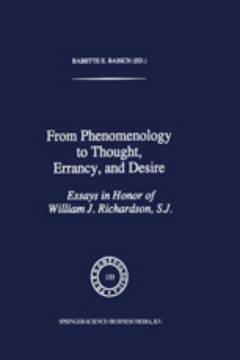Repository | Book | Chapter

(1995) From phenomenology to thought, errancy, and desire, Dordrecht, Springer.
Today's planetary ecological and social problems, which result at least in part from modernity's project of gaining technological control over nature, provide grounds for continuing to study Martin Heidegger's critique of modernity and its domineering impulse, despite the fact that that same critique once led him to embrace National Socialism. After all, during the 1940s, the left-leaning Theodor W. Adorno and Max Horkheimer also criticized modernity in ways that closely resembled Heidegger's critique.' Nevertheless, after Victor Farlas and Hugo Ott revealed that Heidegger's involvement with the Nazi movement was more deeply entangled with his thought than most people had previously believed, many responsible scholars recognized that, henceforth, they would have to read Heidegger's work more carefully, with an eye open for the possible political implications of his philosophical analyses. Though some commentators continue to defend Heidegger by distinguishing between the man (guilty of political misdeeds) and his work (loftily detached from mundane affairs), the fact is that Heidegger himself believed that he was destined to play a key role in the revolutionary transformation — to be carried out by National Socialism — that would supposedly save Germany and the West from modern nihilism.
Publication details
DOI: 10.1007/978-94-017-1624-6_31
Full citation:
Zimmerman, M.E. (1995)., Ontical craving versus ontological desire, in B. Babich (ed.), From phenomenology to thought, errancy, and desire, Dordrecht, Springer, pp. 501-523.
This document is unfortunately not available for download at the moment.


